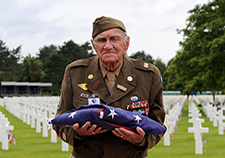Office of Research & Development |
 |

VA Research Currents archive
December 10, 2015

Marion Charles Gray served as an Army medic in World War II and took part in the Normandy invasion. He visited the site in 2009, as part of events honoring the 65th D-Day anniversary. Gray passed away this summer. To learn more about his life and service, visit this VA blog post. (Photo by Crystal Ettridge)
For some war Veterans, posttraumatic growth can happen decades after the trauma.
A team with the Stress, Health, and Aging Research Program at the Boston VA has looked at aging Veterans who grapple with their war traumas only later in life. The group, funded by VA's National Center for PTSD, came up with a concept they call "later-adulthood trauma reengagement," or LATR.
In a recent article in The Gerontologist, they write: "We suggest that later in life many combat Veterans confront and rework their wartime memories in an effort to find meaning and build coherence. Through reminiscence, life review, and wrestling with issues such as integrity versus despair, they intentionally reengage with experiences they avoided or managed successfully earlier in life, perhaps without resolution or integration."
The research is not focused on those for whom PTSD has been an ongoing struggle. Among men who served in Vietnam, for example, about 11 percent are estimated to still have full-blown PTSD, more than four decades after the war, according to the National Vietnam Veterans Longitudinal Study. The figure is 7 percent for women.
Rather, says SHARP co-director Dr. Eve Davison, the work centers on those "who may have been functioning fine, more or less, putting a lot of it on a back burner and going about their lives." But then the stressors of later life hit—things like health problems, or perhaps the loss of a spouse—and the traumatic memories reemerge and demand to be reckoned with.
The reflection can lead to more pain—or new growth.
"It's a process that could resolve in a positive direction—integrity, meaning-making, meaning-finding," says Davison. "If it doesn't proceed in a beneficial way, it can result in symptoms and distress."
Some Veterans can navigate the process alone. Others might be fine with a little help from their friends—perhaps "hanging out with folks at an American Legion hall," says Davison, by way of example.
Others may benefit from a bit of professional guidance. Not in the form of counseling or psychotherapy—after all, the person may not have any diagnosis of depression, anxiety, or any other mental health condition—but through something more akin to a support group. The SHARP group has been studying a format for delivering this help to older Veterans who need it.
"We're piloting groups for non-mental-health patients," says Davison. "The idea is that it's not a treatment group, it's a discussion and psychoeducational group. For some people, giving them more of a framework and opportunity to discuss and explore these issues could facilitate the process, and fend off distress."
A few years ago, the team ran a group for Korean War Veterans. They refined the model based on participant feedback and just recently finished a series of 10 weekly sessions for Vietnam Veterans. The retention rate was 100 percent. The researchers plan to conduct more such groups in the future, and to continue studying their value for Veterans.
Davison hopes the effort will promote posttraumatic growth and more inner peace for those who take part—even if a half-century will have passed since their service.
In an earlier focus group, one Veteran said:
"For me, [wartime military service] helped make me a better person. I began to have more understanding and compassion, more wanting to help people. I became a much better person afterwards, even though it took me years to bring back and relive the war."